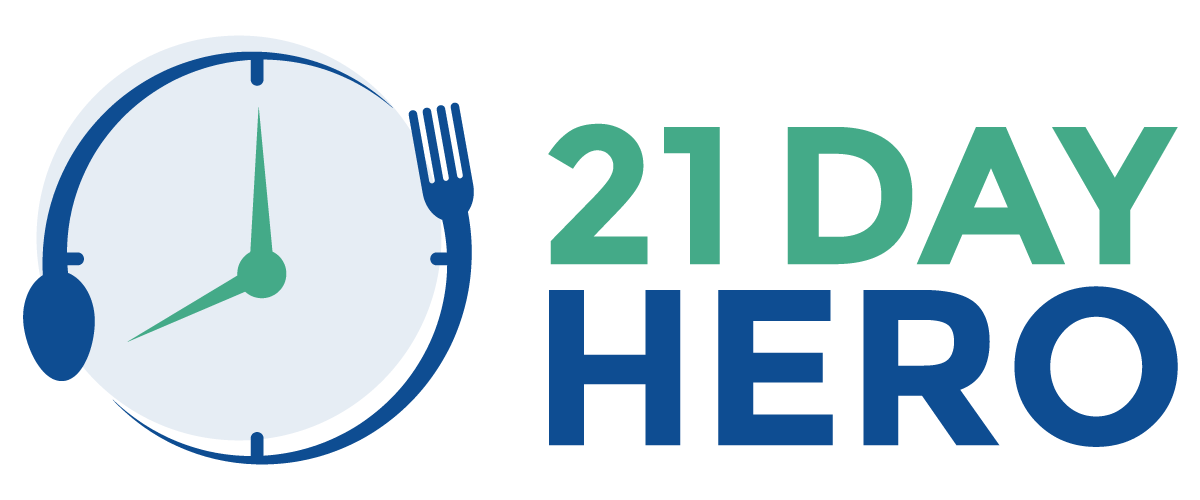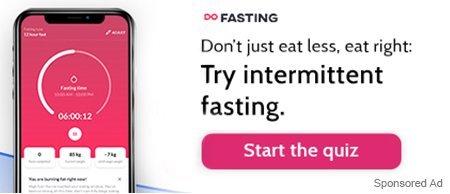Losing weight can be difficult for people. Especially if you have specific eating habits that are non-negotiable and you love food. I mean, who doesn’t enjoy some snacking while watching Netflix?
This is why people choose intermittent fasting, (click the link for our beginner’s guide). It makes losing weight more manageable because you restrict eating to a certain window.
However, what if the desired results are just not showing up? What if you’re not losing weight or hit weight loss plateau?
It can lead to questioning why you started in the first place. Many just give up at this point. But it is not the time to quit. It is just time to analyze your strategy. So fear not, we here at 21 Day Hero have 8 reasons that might just tell you why you are not losing weight on your fast.
We will take the most popular intermittent fasting method – 16:8 as the benchmark and break it down into 2 key parts. The first will look into what you may be doing wrong during your eating window. The second part will focus on possible culprits outside of your eating window.
If you are gaining weight or not losing weight during your intermittent fasting, it is likely you will find the answer below.
Not Losing Weight on Intermittent Fasting: During your Eating Window
#1: You Are Eating Too Much During Your Eating Window
As far as not losing weight on intermittent fasting goes, this is pretty much the holy grail of reasons why it is not working for you. The basic science is simple – eat less than your maintenance, exercise regularly and you will lose weight.
However, during their eating window, people can go a little crazy. Not eating for 16 hours will make you hungry. That much is obvious. However, if you are not accountable for what and when you eat, then you are not going to shed any pounds. There are a few ways to make sure you don’t eat too much during your eating window:
-
- Plan ahead: you don’t need to meal prep days in advance. However, being mindful of what you are planning to eat, understanding your caloric maintenance and knowing how much protein to eat (we will get to that later) are key factors in successful fasting. If you wing it and eat unregulated during your window you open yourself up to not losing weight. You end up not knowing what exactly you are eating and how many calories it might have.
-
- Get a good app: This is what helped me on my journey. Having a quality calorie tracking app like MyFitnessPal or personalized fasting apps like DoFasting can help you build accountability and increase your chances of losing weight. Being able to physically log in and track your calories only stands to help see how far you are progressing. Little wins like this will motivate you and help shed pounds more effectively.
-
- Remember that eating too much healthy food can also lead to weight gain. So be sure to watch your portion sizes.
#2: Watch Your Portion Sizes
Well.. what a coincidence… the old saying ‘too much of a good thing is never a good thing’ comes to mind here. Let’s just say that for whatever reason you are not tracking your food.
Still, a basic understanding of what or how much to eat is still vital in losing weight on intermittent fasting. You can eat the best food possible, but if you are not able to control portions, it can lead to not losing weight or even gaining weight!
In my experience, there are 3 simple solutions to this problem:
- Buy smaller plates
- Get a good app for track your food
- Buy a kitchen scales
Top Tip: if you do all 3, it’s foolproof!
#3: You are not eating enough protein
This may sound a little strange but it’s true. It also links in with the idea that you may not be eating the right kinds of food during your window.
For example, your maintenance might be 1800 calories. However, eating 1800 calories worth of sugary snacks vs eating 1800 calories of quality food will likely yield different results.
Protein is a very important factor in this, not just for muscle repair and maintenance. It also keeps you full for longer. On average, one breast of chicken contains 23-25g of protein and is 180 calories. This will likely leave you more fulfilled and full than a 200 calorie Mars Bar. This is why being mindful of your eating is so important.
Eat more of the good stuff that will benefit you in the long term and you will see results faster.
#4: You are not eating enough during your window
Okay this might seem like it contradicts my earlier point but hear me out. There is actually a huge knock-on effect if you don’t give your body the energy it needs when you do eat.
For one, eating less than you should leave the body craving more nutrients. It makes you more likely to break the fast because you may still be hungry.
Secondly, when people are fasting, they tend to get caught up in micromanaging every meal and every calorie.
That can make people become obsessed with eating less than needed to seemingly quicken the weightloss. All it will do is make the process more difficult.
Depriving the body of what it needs leaves you open to hunger during the fasting window. (see below regarding mood and how it can affect losing weight on your fast).
To fix this: be mindful of your calories and eat until you are full. You have a plan, stick to it!
Not Losing Weight on Intermittent Fasting: Outside your Eating Window
#5: You don’t have the right attitude towards your fast
Scientific studies have shown that intermittent fasting can have a number of benefits on your physical and mental wellbeing.
However, some people enter a fast and underestimate how difficult it can be mentally. They believe that all that has to be done is not eat and then they will suppress cancer cell growth, reduce the risk of diseaseases or will instantly lose weight. When people don’t feel like this is happening, they begin to resent the fast.
There will always be bumps in the road, but not taking your fast seriously from the start is a recipe for failure.
You have to always remember your ‘why’ and understand that there are days when you will be cranky or tired during the eating window. Maintaining self-control and discipline both with food and mentally will reduce the likelihood of breaking your fast and improve your chances to lose weight.
#6: You are struggling to stay accountable
Intermittent fasting can be lonely if you are doing it on your own. Having the support and guidance of other like-minded individuals can be pivotal in helping to find motivation and keep you accountable.
We can suggest a 21-day Intermittent Fasting Challenge to start fasting with a community of supportive people. The challenge includes a meal plan to help navigate the diet and a useful Q&A to answer any questions you might have on fasting.
Finding people to fast along with you can be a way to revive your commitment to intermittent fasting and can help lose weight. You don’t have to do it alone!
#7: You are not getting enough sleep
There have been many studies done on the correlation between intermittent fasting and sleep. As a whole, intermittent fasting does provide a general increase in sleep quality.
However, if you are not getting enough sleep, it can be a prevailing factor in why you are not losing weight during the intermittent fast.
There are 2 reasons for this:
- Lack of discipline: lack of proper sleep affects a chemical called Leptin going to your brain. It tells your brain when you are full. Lack of sleep also increases the production of Ghrelin, a chemical that stimulates appetite. This chemical imbalance will by its very nature affect the ways in which you eat. A lack of discipline caused by this imbalance is a sure-fire way to sabotage your intermittent fasting progress.
- Mood: Comfort eating is no joke! Our mood has a huge impact on our eating habits and lack of sleep can make us quick-tempered, anxious and emotional. Characteristics that do not pair well with weight loss.
#8: You are not drinking enough water
A key tool for helping you to lose weight while fasting is water. It does not break a fast and heralds a host of benefits.
Water itself makes up 60% of our bodies and plays a variety of key roles like digestion, regulation of body temperature and circulation. It is quite common for people to feel like their fast is not working only to find out that they are not drinking much, if any water.
You can do many things right in your fast. However, drinking enough water can be the glue that keeps all of those things together. Even being 2% dehydrated can have an effect on your mood and reduce motor skills!
Furthermore, it can increase blood pressure. This is crucial when you are not in your eating window. If your mood becomes affected, you are more likely to give in to cravings and break your fast.
How to make sure to lose weight on intermittent fasting?
Stick with it, you will see results fast if you eat a whole food diet, avoid processed carbs and sugars, and the weight will start to fall off! Try to maintain a 500 calorie caloric deficit and the weight will naturally go down over time. Walk often, weight train, and simply eat healthy foods!
A great program to follow that will help you lose weight and be more accountable on your intermittent fasting journey is the 21-day Intermittent Fasting Challenge.
Members get access to a community of like-minded fasters, helping them to stick to their goals. Additionally, you receive a meal plan and challenge guide, along with fasting tips and FAQs. It starts every Monday for new members and is the best place to begin your fasting journey. Come join us!















